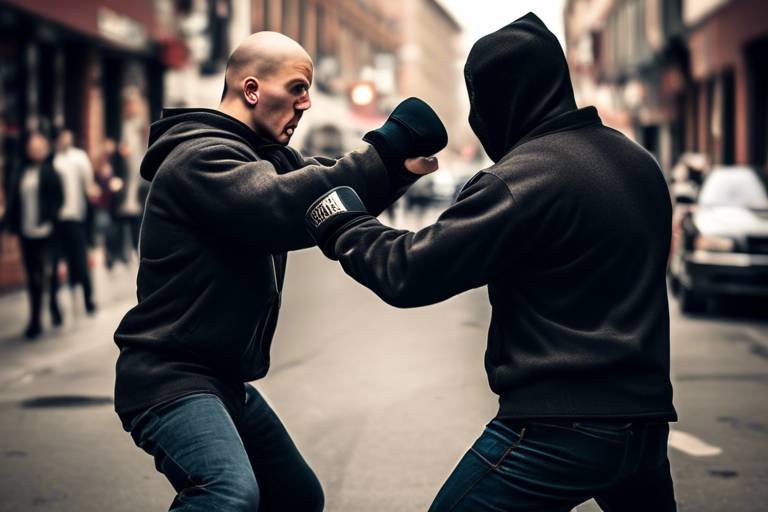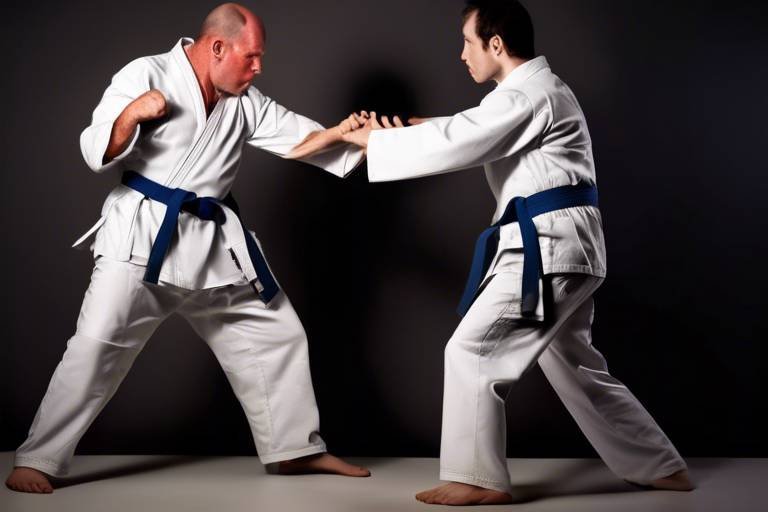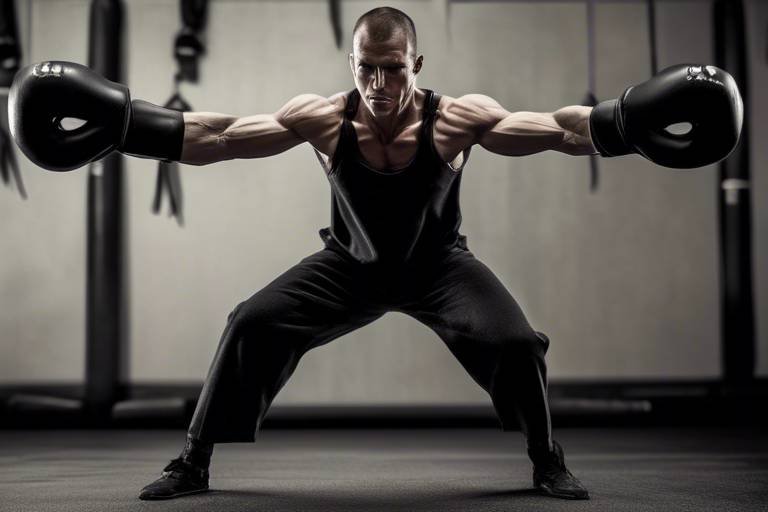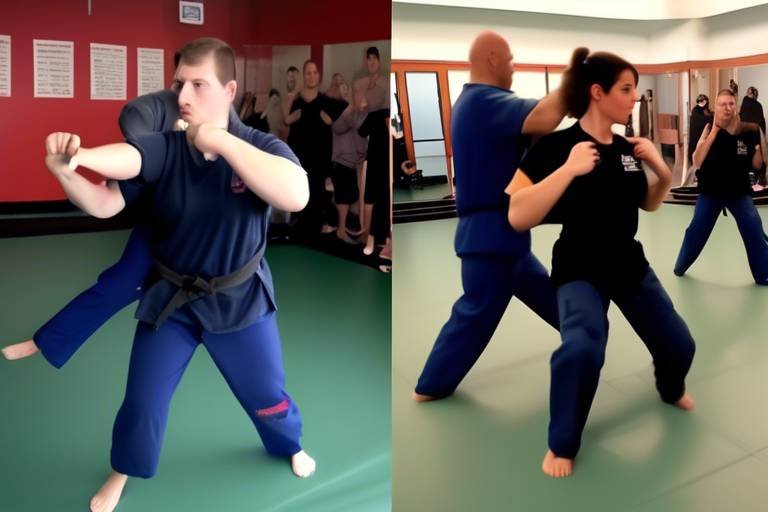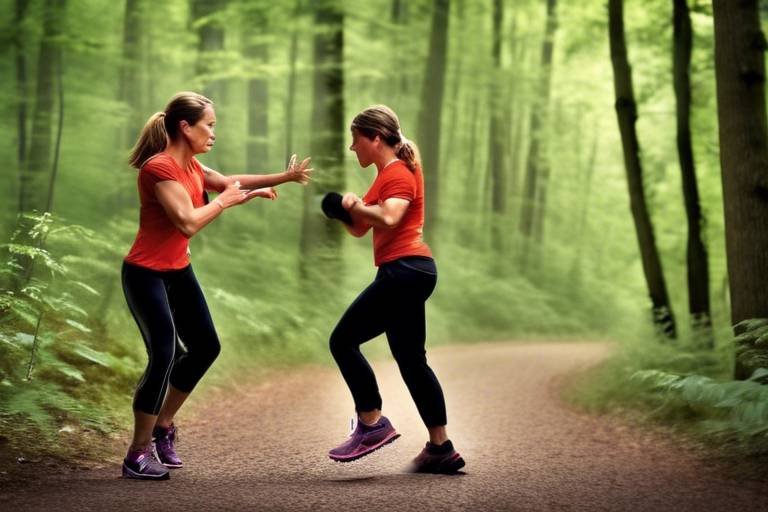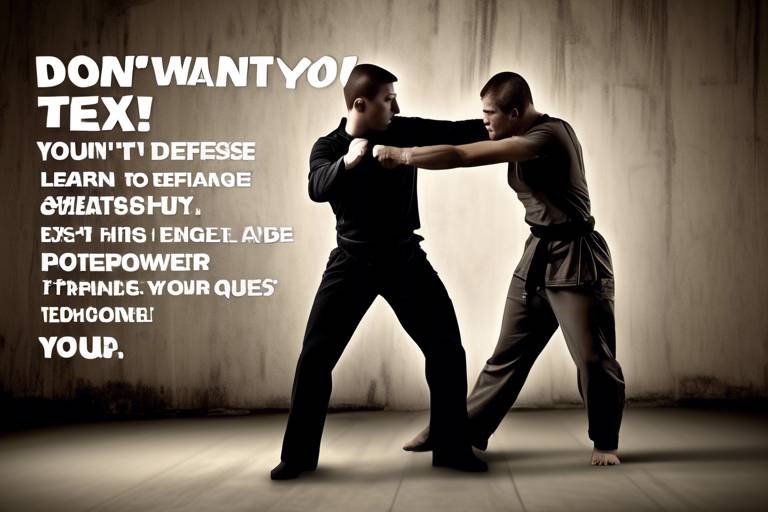Learning Self-Defense Techniques – Is Age Just a Number?
In today's unpredictable world, the importance of self-defense techniques cannot be overstated. Many people might think that self-defense is only for the young and fit, but the truth is, age is merely a number when it comes to learning how to protect oneself. Whether you're a spry teenager or a wise senior, everyone can benefit from acquiring these essential skills. Imagine walking down the street, confident and aware of your surroundings, knowing that you have the ability to handle any situation that may arise. This article delves into the significance of learning self-defense techniques for individuals of all ages, dispelling myths about age limitations, and highlighting the myriad benefits that come with mastering self-defense at any stage in life.
Self-defense is not just about physical combat; it's about empowering individuals to protect themselves in potentially dangerous situations. Understanding the significance of these techniques can be a game-changer for people of all ages. It’s about instilling a sense of security and confidence that transcends mere physical prowess. When you learn self-defense, you’re not just gaining skills; you’re gaining peace of mind. This newfound awareness can motivate people to take action, regardless of their age or physical ability. After all, wouldn’t you feel more at ease knowing that you could stand your ground if necessary?
Learning self-defense offers a treasure trove of advantages that extend far beyond just knowing how to throw a punch or escape a hold. Here are some key benefits:
- Increased Confidence: Mastering self-defense techniques significantly boosts your self-esteem. You learn to trust your instincts and abilities, which can positively impact various aspects of your life, from social interactions to professional environments.
- Improved Physical Fitness: Engaging in self-defense classes enhances physical fitness, promoting strength, flexibility, and coordination. These improvements are beneficial for overall health and can be particularly advantageous for older adults.
- Enhanced Awareness: Self-defense training sharpens your awareness of your surroundings, making you more alert to potential dangers and helping you avoid risky situations.
Self-defense training is a powerful tool for building confidence. As individuals learn new techniques, they begin to trust their instincts and capabilities. This process of self-discovery can profoundly affect their lives. Imagine a shy person, once hesitant to speak up in a group, now standing tall and asserting their opinions. It’s not just about physical prowess; it’s about the mental transformation that occurs through training. The skills learned in self-defense classes often translate into other areas of life, empowering individuals to tackle challenges head-on.
Fear and anxiety regarding personal safety are common, but self-defense training helps individuals confront and manage these feelings. By equipping participants with the skills to handle potential threats effectively, self-defense training transforms fear into empowerment. Imagine walking through a crowded street, feeling a sense of calm because you know you can defend yourself if the need arises. This shift in mindset is invaluable.
Training in self-defense not only fortifies physical skills but also cultivates mental resilience. Participants learn to remain calm under pressure and make quick decisions—traits essential in any challenging situation. Think of it as building a mental muscle: the more you train, the stronger and more capable you become. This resilience can help you navigate life's challenges beyond physical confrontations.
Engaging in self-defense classes is a fantastic way to improve physical fitness. These classes promote strength, flexibility, and coordination, which are crucial for overall health. For older adults, the benefits are particularly pronounced. Regular participation in self-defense training can lead to improved balance and mobility, reducing the risk of falls and injuries. It’s not just about learning to defend yourself; it’s about enhancing your quality of life.
Age should never be a deterrent when it comes to pursuing self-defense training. There are various techniques and classes designed to cater to different age groups, ensuring that everyone can find suitable options to learn and practice self-defense. It’s essential to recognize that self-defense is for everyone, regardless of age or physical condition. By tailoring training to different groups, instructors can create a welcoming environment that encourages participation and growth.
Seniors can benefit immensely from self-defense training tailored to their unique needs. Classes designed for older adults focus on techniques that consider mobility and strength, making learning accessible and enjoyable. These programs often emphasize situational awareness and simple, effective techniques that can be easily integrated into daily life. Imagine a senior confidently navigating their neighborhood, feeling secure and empowered. That’s the goal of tailored self-defense training.
Youth self-defense programs are crucial for teaching children and teenagers how to protect themselves. These classes instill valuable life skills, including self-discipline and respect for others, while promoting safety awareness. By learning self-defense at a young age, kids develop confidence and the ability to assess risks, which can positively impact their social interactions and overall development. It’s about giving them the tools they need to navigate the world safely.
Q: Is self-defense training suitable for all ages?
A: Absolutely! Self-defense training can be adapted for individuals of any age, from children to seniors.
Q: Do I need to be physically fit to start self-defense training?
A: Not at all! Self-defense classes can accommodate various fitness levels, and training will help improve your physical condition over time.
Q: What if I have mobility issues?
A: Many self-defense programs are designed specifically for individuals with mobility challenges, focusing on techniques that are safe and effective.
Q: How can self-defense training benefit my mental health?
A: Self-defense training can boost your confidence, reduce anxiety, and improve your overall mental resilience, helping you feel more secure in your daily life.

The Importance of Self-Defense
Self-defense is not just about throwing punches or mastering complex moves; it's a vital skill set that empowers individuals to protect themselves in potentially dangerous situations. Imagine walking down a dimly lit street and suddenly feeling a sense of unease. That gut feeling? It's your instinct kicking in. By learning self-defense techniques, you can transform that instinct into action, enabling you to respond effectively rather than react out of fear.
Understanding the significance of self-defense goes beyond physical safety. It’s about empowerment. When individuals learn self-defense, they gain a sense of control over their lives and environments. This newfound confidence can spill over into various aspects of life, from personal relationships to professional situations. Think of it as equipping yourself with a mental toolkit; each technique learned adds another tool to help you navigate life’s challenges.
Moreover, self-defense training is a great way to enhance your awareness of your surroundings. It teaches you to be vigilant, to notice details that you might have overlooked before. For instance, you might start recognizing potential escape routes in a crowded area or identifying suspicious behavior in a public space. This heightened awareness can significantly reduce the likelihood of becoming a target.
Consider this: self-defense skills are not just for those who feel threatened. They are a proactive measure for anyone who values personal safety. Whether you are a student, a working professional, or a retiree, understanding how to defend yourself can provide peace of mind. In fact, self-defense classes often emphasize the importance of avoiding confrontation whenever possible, teaching participants to de-escalate situations before they turn dangerous.
In essence, the importance of self-defense cannot be overstated. It’s about fostering a mindset of safety, awareness, and confidence that benefits individuals of all ages. So, why wait? The journey to becoming more self-reliant and aware begins with the first step into a self-defense class.
- Is self-defense training suitable for all ages? Yes, self-defense training can be adapted for individuals of all ages, from children to seniors.
- Do I need to be physically fit to learn self-defense? No, self-defense techniques can be tailored to accommodate different fitness levels and physical abilities.
- How long does it take to learn self-defense? The time it takes to learn self-defense varies by individual and training frequency, but even a few classes can provide valuable skills.
- Can self-defense training help with anxiety? Absolutely! Many individuals find that self-defense training helps them manage anxiety related to personal safety.

Benefits of Learning Self-Defense
Learning self-defense is not just about mastering physical techniques; it’s a journey that brings a multitude of benefits to individuals of all ages. Whether you’re a teenager navigating the complexities of high school or a senior looking to maintain independence, self-defense training can be a transformative experience. One of the most significant advantages is the boost in confidence that comes with acquiring these skills. Imagine walking down the street, feeling empowered and secure in your ability to handle unexpected situations. This newfound confidence often spills over into other areas of life, enhancing social interactions and professional engagements.
Moreover, self-defense training promotes physical fitness. Engaging in these classes involves various physical activities that improve strength, flexibility, and coordination. For instance, striking techniques require a good deal of upper body strength, while ground defense moves enhance overall flexibility. This holistic approach to fitness is particularly beneficial for older adults, as it helps maintain mobility and reduces the risk of falls. In fact, studies have shown that individuals who participate in self-defense classes often report better overall health and vitality.
Another key benefit is the development of awareness regarding one’s surroundings. In self-defense training, participants learn to recognize potential threats and to assess situations critically. This heightened awareness can be life-saving. For example, by understanding body language and recognizing suspicious behavior, individuals can avoid dangerous encounters before they escalate. This skill is invaluable, especially in today’s fast-paced world where distractions are everywhere.
Additionally, learning self-defense can help individuals overcome fear and anxiety. Many people live with a constant fear of potential threats, which can be debilitating. Through training, individuals confront these fears head-on, gaining the tools needed to manage anxiety effectively. This process not only equips them with the skills to defend themselves but also instills a sense of control over their lives. It’s like learning to ride a bike; at first, you may feel scared, but with practice, you gain confidence and mastery.
Finally, self-defense classes are also a fantastic way to build community. Many training sessions foster a supportive environment where individuals can connect with others who share similar goals. This camaraderie can lead to lasting friendships and a sense of belonging, which is essential for mental well-being. So, whether you’re looking to improve your fitness, boost your confidence, or simply learn how to protect yourself, the benefits of learning self-defense are vast and impactful.
- Can anyone learn self-defense? Absolutely! Self-defense training is designed for individuals of all ages and fitness levels.
- Is self-defense training safe? Yes, reputable self-defense classes prioritize safety and provide a supportive learning environment.
- How long does it take to learn self-defense? The duration varies, but many people see significant improvements within a few weeks of regular training.
- Do I need to be physically fit to start self-defense training? Not at all! Self-defense classes can cater to all fitness levels, and they often help improve your fitness over time.

Building Confidence Through Training
Self-defense training is not just about learning how to throw a punch or execute a perfect kick; it's a transformative journey that builds confidence from the ground up. Imagine walking into a room filled with strangers, and instead of feeling small or anxious, you stand tall, radiating self-assurance. That’s the power of self-defense training. It teaches individuals to trust their instincts and abilities, which can have a ripple effect on various aspects of their lives.
When you engage in self-defense classes, you’re not just learning techniques; you’re also engaging in a process of personal growth. Each session is an opportunity to push your limits, face challenges, and emerge stronger. As you practice, you’ll find yourself overcoming obstacles that once seemed insurmountable. This newfound strength translates to a boost in self-esteem, making you feel more capable in everyday situations.
Consider the scenario of a young person learning self-defense. Initially, they may feel uncertain about their physical abilities. However, as they progress through the training, they begin to master techniques and see real improvement. This process fosters a sense of accomplishment, leading to a more confident individual who is not easily intimidated. Similarly, older adults can experience a revival of confidence as they learn skills that empower them to navigate the world with greater assurance.
Moreover, confidence gained through self-defense training is not limited to physical prowess. It extends to mental fortitude. Participants learn to stay calm under pressure, make quick decisions, and assess situations critically. These skills are invaluable, not only in self-defense scenarios but also in everyday life. Whether it’s negotiating a raise at work or handling a difficult conversation, the confidence built in the dojo or training space spills over into all areas of life.
In addition, the camaraderie developed in self-defense classes plays a significant role in building confidence. Training alongside others creates a supportive environment where individuals encourage each other to grow. This sense of community fosters friendships and provides a safe space to learn, making the journey enjoyable and less intimidating. As you learn and grow with your peers, the fear of failure diminishes, replaced by a shared determination to improve.
Ultimately, self-defense training is a powerful catalyst for building confidence. It equips individuals with not just physical skills but also a resilient mindset. So, whether you’re a teenager looking to find your place in the world or a senior seeking to regain a sense of empowerment, self-defense training can be the key to unlocking your full potential.
- What age is appropriate to start self-defense training? Self-defense can be learned at any age, with programs tailored for children, teens, adults, and seniors.
- Do I need to be physically fit to start self-defense training? No! Self-defense training is designed to accommodate all fitness levels, and you will improve as you train.
- How long does it take to learn self-defense? The time varies based on the individual and the complexity of techniques, but noticeable improvements can often be seen within a few weeks.
- Can self-defense training help with anxiety? Yes! Many individuals find that learning self-defense techniques helps reduce anxiety and increases confidence in their ability to handle potential threats.

Overcoming Fear and Anxiety
Many individuals grapple with feelings of fear and anxiety when it comes to personal safety. It's a common reaction—after all, the world can sometimes feel like a daunting place. However, what if I told you that learning self-defense could be a powerful antidote to these feelings? Engaging in self-defense training not only equips you with practical skills but also serves as a mental balm for those nagging worries that can cloud your mind.
When you step into a self-defense class, you're not just learning how to throw a punch or escape a hold; you're embarking on a journey of self-discovery. As you practice various techniques, you begin to confront your fears head-on. Each session becomes a mini-laboratory for testing your limits and pushing through discomfort. You learn to trust your instincts and develop a sense of empowerment that can transform your outlook on life.
Consider this: every time you successfully execute a technique, you're not just mastering a skill; you're also dismantling the walls of anxiety that may have held you captive. It's akin to climbing a mountain—each step forward is a victory that builds your confidence. As you progress, you may find that the fear that once paralyzed you begins to dissipate, replaced by a newfound resilience.
Moreover, self-defense training fosters a supportive community. You're surrounded by like-minded individuals who share similar concerns and experiences. This camaraderie can be incredibly uplifting, as you encourage one another to confront challenges together. In this environment, fear becomes a shared experience rather than a solitary struggle, which can significantly reduce its power over you.
Ultimately, the skills you gain in self-defense training extend beyond the physical realm. They seep into your daily life, enabling you to approach situations with a clearer mind and a more confident demeanor. You might find yourself facing social situations or professional challenges with an assertiveness that was previously lacking. It's like flipping a switch; once you learn to stand your ground in a self-defense scenario, you realize that you can also stand your ground in other areas of your life.
In summary, self-defense training is not just about learning how to protect yourself; it's about overcoming fear and anxiety in a holistic way. As you train, you cultivate a sense of control over your life, transforming fear into strength. So, if you're feeling anxious about your personal safety, why not take that first step? Join a self-defense class and discover how empowering it can be to face your fears and emerge stronger than ever.
- What age is appropriate to start self-defense training? Self-defense training can be beneficial for individuals of all ages, from children to seniors. It's important to find a program that caters to your age group and physical abilities.
- Do I need to be fit to start self-defense training? No, self-defense classes are designed for all fitness levels. The focus is on learning techniques that can be adapted to your personal capabilities.
- How long does it take to become proficient in self-defense? Proficiency varies by individual, but consistent practice over a few months can lead to significant improvement in skills and confidence.
- Are self-defense classes safe? Yes, reputable self-defense classes prioritize safety and ensure that techniques are taught in a controlled environment.

Developing Mental Resilience
When we think about self-defense, we often picture physical confrontations, but there’s a whole other side to it that’s just as crucial: mental resilience. Imagine being in a high-pressure situation where your heart is racing, and your mind is clouded with doubt. How do you react? This is where the beauty of self-defense training shines. It goes beyond just teaching you how to throw a punch or escape a hold; it prepares your mind to handle stress and uncertainty with grace and composure.
Self-defense classes are designed to challenge not only your physical abilities but also your mental fortitude. Through various scenarios and drills, you learn to stay calm under pressure. For instance, during a sparring session, you might find yourself overwhelmed by your opponent’s speed and aggression. But instead of panicking, you start to think strategically. You assess the situation, identify your options, and make quick decisions. This process of critical thinking and problem-solving in the heat of the moment is what builds mental resilience.
Moreover, self-defense training encourages positive self-talk. When faced with challenges, individuals often default to negative thoughts, doubting their abilities and fearing failure. However, through consistent practice, you learn to replace those doubts with affirmations. You start to tell yourself, “I can handle this,” or “I’ve trained for this.” This shift in mindset is vital, as it not only enhances your performance during training but also spills over into everyday life, helping you tackle challenges with a newfound confidence.
In addition, self-defense training fosters a sense of community and support. When you train with others, you share experiences, fears, and triumphs. This camaraderie builds a network of encouragement that reinforces your mental strength. You realize that you’re not alone in your journey, and that shared experience can be incredibly empowering. The friendships formed in these classes often provide a safety net, reminding you that you have a support system to lean on when the going gets tough.
In summary, developing mental resilience through self-defense is about more than just learning how to defend yourself physically. It’s about cultivating a mindset that embraces challenges, fosters confidence, and builds a network of support. So, whether you’re a senior looking to enhance your self-assurance or a young adult navigating the complexities of life, remember that the mental skills you gain from self-defense training are just as important as the physical techniques. They equip you to face life’s adversities head-on, making you not just a fighter, but a survivor.
- What age is appropriate to start self-defense training? There is no specific age limit. Children as young as five can start learning basic self-defense techniques, while adults of any age can benefit from training.
- Do I need to be physically fit to learn self-defense? Not at all! Self-defense classes cater to all fitness levels, and the training can be adjusted to suit your individual abilities.
- How long does it take to become proficient in self-defense? Proficiency varies from person to person, but consistent practice over a few months can significantly improve your skills and confidence.
- Can self-defense training help with anxiety? Yes! Many people find that self-defense training helps reduce anxiety by empowering them with skills and boosting their confidence.

Physical Fitness and Self-Defense
Engaging in self-defense classes is not just about learning how to throw a punch or escape a hold; it's also a fantastic way to boost your physical fitness. When you step onto the mat or into the dojo, you're not just training your mind but also your body. These classes typically incorporate a variety of exercises that enhance your strength, flexibility, and coordination. Imagine transforming your body while gaining the skills to protect yourself—it's like hitting two birds with one stone!
One of the most significant benefits of self-defense training is the improvement in overall physical health. As you practice various techniques, you engage different muscle groups, which leads to increased strength and endurance. For instance, consider the difference between a sedentary lifestyle and one filled with dynamic movements like kicking, punching, and grappling. You will not only feel more energized but also notice a remarkable change in your body composition over time.
Moreover, flexibility is a crucial aspect of both physical fitness and self-defense. Many self-defense techniques require a certain level of agility and flexibility to execute effectively. As you work on your moves, you'll find that your body becomes more limber, making everyday activities easier and reducing the risk of injury. Think of it as giving your body a much-needed tune-up, allowing you to move with grace and confidence.
Coordination is another vital skill developed through self-defense training. Many techniques require you to coordinate your hands, feet, and body movements simultaneously. This not only sharpens your physical abilities but also enhances your cognitive functions. It's like a mental workout as you strategize your next move while keeping your body in sync. The more you practice, the more natural these movements will become, and you'll find yourself moving with a newfound sense of control and confidence.
Additionally, self-defense classes often incorporate cardiovascular exercises, which are essential for heart health. Whether it's through high-energy drills or sparring sessions, your heart rate will rise, promoting better circulation and overall cardiovascular fitness. This aspect of training is particularly beneficial for older adults, as maintaining heart health becomes increasingly important with age. It’s like giving your heart a workout while also learning how to defend yourself!
In conclusion, the journey of learning self-defense is a holistic experience that encompasses more than just physical techniques. It’s about building a stronger, healthier body while gaining the skills to protect yourself. Whether you're a teenager looking to gain confidence or a senior wanting to stay active, self-defense training offers a unique blend of fitness and self-empowerment. So, why not take the leap? Your body and mind will thank you!
- Can anyone learn self-defense, regardless of age?
Absolutely! Self-defense techniques can be adapted to suit individuals of all ages and fitness levels. - Do I need to be physically fit to start self-defense training?
No prior fitness level is necessary. Self-defense classes will help improve your fitness as you learn. - What should I wear to self-defense classes?
Comfortable athletic wear is recommended, along with supportive shoes that allow for movement. - How long does it take to learn effective self-defense techniques?
The time varies by individual, but consistent practice over weeks and months will yield noticeable improvements.

Age Considerations in Self-Defense Training
When it comes to self-defense training, many people mistakenly believe that age is a limiting factor. However, the truth is that self-defense techniques can be adapted to suit individuals of all ages. Whether you're a sprightly teenager or a wise senior, there are programs and techniques specifically designed to meet your needs. This adaptability not only makes self-defense accessible but also ensures that everyone can benefit from the empowerment that comes with learning these crucial skills.
For instance, younger individuals often have the advantage of agility and quick reflexes. Self-defense classes for youth typically focus on building a foundation of skills that emphasize awareness, avoidance, and basic defensive techniques. These classes not only teach physical skills but also instill a sense of responsibility and respect for others, which is vital in today's world. In fact, many youth self-defense programs incorporate elements of conflict resolution and communication, ensuring that students are well-rounded in their approach to personal safety.
On the other hand, seniors may have different considerations when it comes to self-defense training. It's essential to recognize that older adults may face unique challenges, such as reduced mobility or strength. Thankfully, many self-defense classes are tailored specifically for seniors, focusing on techniques that prioritize safety and practicality. These programs often emphasize:
- Situational awareness to help seniors identify potential threats before they escalate.
- Simple yet effective techniques that require minimal physical strength.
- Strategies for de-escalating confrontations and avoiding physical altercations whenever possible.
Moreover, self-defense training for seniors can be a fantastic way to improve overall physical fitness. Engaging in these classes can lead to enhanced strength, flexibility, and coordination, which are beneficial not just for self-defense but for maintaining an active lifestyle. It's a win-win situation that promotes both safety and health.
Interestingly, age can also bring a wealth of experience and wisdom, which can be advantageous in self-defense scenarios. Older individuals often possess a greater understanding of their surroundings and can use their life experiences to navigate potentially dangerous situations more effectively. This mental acuity, combined with physical training, creates a formidable defense mechanism.
In conclusion, age should never be seen as a barrier to learning self-defense. Regardless of whether you are young or young at heart, there are suitable options available. The key is to find a program that resonates with your personal needs and goals. By embracing self-defense training, individuals can cultivate not only physical skills but also a profound sense of confidence and resilience that transcends age.
Q: Can seniors really benefit from self-defense training?
A: Absolutely! Self-defense training for seniors is specifically designed to accommodate their needs, focusing on safety, awareness, and techniques that require minimal physical strength.
Q: Are youth self-defense programs effective?
A: Yes! Youth self-defense programs teach valuable skills that empower children and teenagers to protect themselves while also promoting self-discipline and respect.
Q: Is it too late to learn self-defense if I'm older?
A: Not at all! It's never too late to learn self-defense. Many programs are tailored for older adults, ensuring that everyone can participate and benefit.

Tailored Training for Seniors
As we age, our bodies change, and so do our needs. This is particularly true when it comes to self-defense training. recognizes these changes and provides a supportive environment that caters specifically to older adults. Unlike typical self-defense classes that may focus on high-intensity techniques and physical prowess, senior-focused programs emphasize practical skills and situational awareness that can be applied in everyday life.
One of the key aspects of these tailored programs is the focus on mobility and strength. Instructors design lessons that take into account the physical limitations that some seniors may face. For instance, classes often incorporate gentle exercises that enhance flexibility and balance, which are crucial for preventing falls and injuries. Furthermore, seniors learn self-defense techniques that do not rely on brute strength but instead utilize leverage and body mechanics, making them accessible to individuals of all fitness levels.
Moreover, these classes often promote a sense of community among participants. Many seniors find that joining a self-defense class not only empowers them physically but also socially. They meet like-minded individuals, share experiences, and build friendships, creating a supportive network. This camaraderie can significantly boost their confidence and motivation to continue training.
Another important aspect of tailored training is the emphasis on mental preparedness. Seniors are taught to recognize potentially dangerous situations and how to react appropriately. This training includes role-playing scenarios that help participants practice their responses in a safe environment. By learning to trust their instincts and make quick decisions, seniors can enhance their overall sense of security.
To illustrate the benefits of tailored training for seniors, consider the following table that outlines some key features of these programs:
| Feature | Description |
|---|---|
| Mobility Focus | Exercises that enhance flexibility and balance. |
| Self-Defense Techniques | Leverage-based techniques that require minimal physical strength. |
| Community Building | Opportunities to connect with peers and foster friendships. |
| Mental Preparedness | Training that emphasizes situational awareness and decision-making. |
In conclusion, tailored training for seniors is not just about learning to defend oneself; it's about fostering a sense of empowerment, community, and resilience. By participating in these specialized self-defense classes, seniors can embrace their age while gaining valuable skills that enhance their safety and confidence in daily life.
- What age is considered "senior" for self-defense training? Generally, individuals aged 60 and above are considered seniors, but many programs welcome participants of all ages.
- Are self-defense classes safe for seniors? Yes, classes designed for seniors prioritize safety and adapt techniques to accommodate various physical abilities.
- How long does it take to learn self-defense? The time it takes varies depending on the individual and the complexity of the techniques, but many see significant improvement within a few weeks.
- Can seniors participate in mixed-age self-defense classes? Absolutely! Many seniors find mixed-age classes beneficial as they can learn from younger participants while sharing their own experiences.

Youth Self-Defense Programs
In today’s world, equipping our youth with the skills to defend themselves is more important than ever. serve as a crucial foundation for teaching children and teenagers not only how to protect themselves but also how to navigate the complexities of social interactions. These programs are designed to be engaging and educational, ensuring that young participants grasp the essential techniques while also enjoying the process of learning.
One of the primary goals of youth self-defense programs is to instill a sense of confidence in young individuals. By mastering self-defense techniques, they learn to trust their instincts and abilities, which can have profound effects on their self-esteem. Imagine a shy teenager who once hesitated to speak up in class, now standing tall, empowered by the knowledge that they can handle themselves in potentially dangerous situations. This transformation is not just about physical strength; it’s about fostering a mindset of resilience and assertiveness.
Moreover, these programs often emphasize the importance of awareness and prevention. Participants learn to recognize their surroundings and identify potential threats before they escalate. This proactive approach not only enhances their safety but also encourages them to be more mindful of their environment. For instance, a young person trained in self-defense might notice suspicious behavior in a crowded area and take steps to avoid a confrontation, showcasing the preventative skills they’ve acquired.
In addition to physical techniques, youth self-defense programs often incorporate valuable life lessons about respect, discipline, and teamwork. Through group activities and sparring sessions, participants learn how to work together, support one another, and develop camaraderie. This social aspect is vital, as it teaches young people the importance of community and looking out for each other, which can lead to lasting friendships and a supportive network.
To further enhance the learning experience, many youth self-defense programs include a variety of activities that cater to different learning styles. For example, some classes may focus on verbal de-escalation techniques, teaching participants how to diffuse potentially dangerous situations through communication rather than physical confrontation. Others might incorporate role-playing scenarios, allowing students to practice their responses in a safe, controlled environment. This multifaceted approach not only makes learning fun but also ensures that students are well-prepared for real-life situations.
Lastly, it’s essential to highlight that youth self-defense programs are inclusive and adaptable. Instructors often tailor their lessons to accommodate different skill levels and physical abilities, ensuring that every participant can engage and benefit from the training. This inclusivity fosters a sense of belonging and encourages young people to challenge themselves, regardless of their starting point.
Here are some common questions about youth self-defense programs:
- What age is appropriate for youth self-defense training? Most programs cater to children aged 5 and up, with classes designed for different age groups.
- Are these programs only for boys? Absolutely not! Youth self-defense programs are for everyone, regardless of gender.
- How long does it take to learn self-defense? While some may grasp the basics quickly, becoming proficient takes time and practice. Regular attendance in classes can significantly enhance skills.
- Will my child learn to fight? The focus is on self-defense and avoidance of conflict, not on promoting fighting. The goal is to empower and educate.
Frequently Asked Questions
- Is self-defense training only for young people?
No way! Self-defense training is for everyone, regardless of age. Whether you're a teenager or a senior, there are techniques and classes designed to suit your needs. It's all about finding the right fit for you, so you can learn to protect yourself effectively.
- What are the benefits of learning self-defense?
Learning self-defense comes with a treasure trove of benefits! It boosts your confidence, enhances your physical fitness, and sharpens your awareness of your surroundings. Plus, it equips you with essential skills to handle potential threats, making you feel safer and more empowered in your daily life.
- Can seniors participate in self-defense classes?
Absolutely! There are self-defense classes specifically tailored for seniors, focusing on techniques that accommodate mobility and strength. These classes not only teach valuable skills but also promote social interaction and physical fitness, making them a fantastic choice for older adults.
- How does self-defense training help with anxiety?
Self-defense training is a powerful tool for managing fear and anxiety. By learning to confront potential threats, individuals can gain a sense of control over their safety. This training helps build mental resilience, teaching you to stay calm under pressure and make quick decisions when it matters most.
- Are there programs for children and teenagers?
Yes, there are many youth self-defense programs available! These classes are designed to teach kids and teens how to protect themselves while instilling important life skills like self-discipline and respect for others. It's a fun and engaging way for them to learn about safety and personal empowerment.
- Do I need to be physically fit to start self-defense training?
Not at all! Self-defense training is accessible to people of all fitness levels. Classes are designed to help you improve your strength and coordination over time. So whether you're starting from scratch or looking to enhance your skills, there's a place for you in self-defense training.
- What should I wear to a self-defense class?
Comfortable clothing is key! You want to wear something that allows you to move freely. Athletic wear, like gym shorts and a t-shirt, is usually a great choice. Don't forget supportive footwear, as you'll be on your feet and practicing various techniques!


